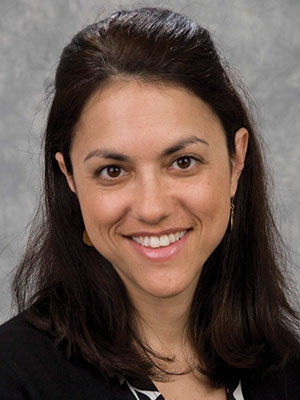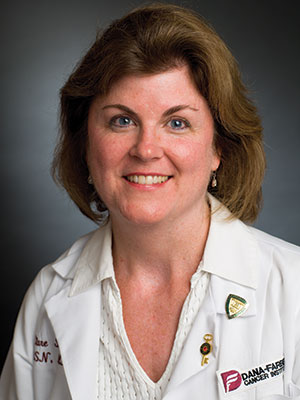Now that my cancer treatment is over, what traits should I look for in a primary care doctor?

Shawna Hudson, Medical Sociologist at Rutgers University Robert Wood Johnson Medical School in New Brunswick, New Jersey. Photo courtesy of Robert Wood Johnson Medical School
SHAWNA HUDSON: The most important thing is to find a primary care provider you can rely on. If you had a primary care doctor before your diagnosis and have a strong relationship with that person—maybe the doctor followed you through treatment—he or she might be the perfect person.
If you didn’t have a strong connection with your primary care doctor before, then you might want to look for someone new. Ask your cancer care providers for a referral to somebody they have worked well with before.
The ideal scenario is to find a primary care doctor who can mesh with your cancer care team. That way, as things come up, it’s easier to get referrals and go back and forth between your primary care doctor and your cancer team.
After cancer, there may be various issues to consider. In addition to follow-up with your cancer team, for example, you may need to see a specialist like a cardiologist to address potential toxicity from chemotherapy treatment. If your primary care doctor is connected to your cancer team, he or she can help in making sure tests are happening as needed.
One major issue for cancer survivors is coordinating care and making sure they are getting the follow-up they need at the right time with the right provider. Ideally, you want a primary care doctor who is happy to help with that coordination. Look for somebody who will do that and sees that as their role.
Another important practical consideration is your insurance coverage. Find out who is in your network. Start with those physicians first.
Last but not least, you’ll need to try this new doctor out. If you don’t have a good rapport with the doctor, it doesn’t matter how great you’ve heard he or she is. You’ll have to have that first meeting to ensure it’s a good fit.
PRIMARY CARE FOR SURVIVORS // Cancer.net offers strategies for finding a new doctor. // The Rogel Cancer Center provides advice on the transition from active treatment to survivorship. // The National Cancer Institute has resources to help find follow-up care after cancer treatment.
My child’s cancer is in remission. How can I stop worrying?

Margery Davis, Social Work Manager at Memorial Sloan Kettering Cancer Center in New York City. Photo courtesy of Memorial Sloan Kettering Cancer Center
MARGERY DAVIS: Childhood cancer is not something that is expected. As a parent, you’ve watched your child suffer, and you’ve gone through your own painful experience. It’s important to take the time to do your own healing. You’ve made sure your child had the care he or she needed to move forward with life after cancer. Taking the time to process and heal will help you remain present for your child going forward.
Ask yourself, what are the ingredients of your worry? It’s natural for worry to peak at certain times, for instance, when a child goes in for a checkup or scan.
Understand, too, that worry is a constant for a parent. Like other parents, you will have different worries that arise with each phase of a child’s life, including “normal” worries and those related to possible recurrence and the long-term effects of treatment.
A child who has undergone treatment for cancer may face long-term difficulties. In some cases, there may be lifelong learning challenges as a side effect of treatment, or a child may not grow as fast as his or her peers. You may have concerns about future infertility. By understanding the source of your worries, it may help you to manage them.
I find too many parents worry in silence. Sometimes, when I ask parents if they talk about the illness experience as a family, they’ll say, “No, we don’t talk about it.” You may want to be “normal” and to focus on that. But I often find that ongoing communication within the family is helpful. Cancer is part of your child’s identity and narrative. Your child may have questions or worries of his or her own. It helps to keep the lines of communication open in the family instead of bottling it all up.
You should also ask for help if you need it. Go back to your child’s medical team and ask if there’s a social worker you can talk to who specializes in survivorship. Nobody really knows the best way for you to do this. But there are people who can help.
CHILDHOOD AFTER CANCER // American Childhood Cancer Organization provides free resources to help families and kids with cancer. // The National Cancer Institute offers a list of questions to ask your child’s care team after cancer. // The Cleveland Clinic has tips on how to get your child back on track after cancer.
What can I expect from peripheral neuropathy?

Clare Sullivan, Clinical Program Manager of Patient Education at Dana-Farber Cancer Institute in Boston. Photo courtesy of Dana-Farber Cancer Institute
CLARE SULLIVAN: First, it’s useful to remember that the nervous system includes both the central nervous system, consisting of the brain and spinal cord, and the peripheral nervous system. The latter comprises the nerves running from the brain and spinal cord to the rest of the body—your arms and legs as well as your internal organs and skin.
Peripheral neuropathy isn’t necessarily a single disease. It’s a general term used when there’s damage to the peripheral nervous system. When the peripheral nerves are damaged, messages from the brain and central nervous system can’t get through properly. In cancer, it occurs most often as a side effect of chemotherapy, although it may be a symptom of the cancer.
Most people associate this condition with pain, numbness or tingling. But there can be different clusters of symptoms. Some patients might experience sweating or twitching. There may be constipation, muscle weakness or bladder issues. I’ve had patients say they are falling a lot. Patients may experience sensitivity to heat. The symptoms will depend on the location of the nerves that have been damaged.
The most important point I want to make is that no matter how minor the symptom may feel to you, it’s always good to call your health care team right away, even if it’s just a little sensitivity in one finger.
There are a lot of claims out there about treatments for peripheral neuropathy, but unfortunately, there is little evidence that they work. So talk first with your health care provider before you try these other methods. There are some small studies suggesting that calcium and magnesium might help. You might try acupuncture.
Remember to be safe. For example, if you realize that your walking is affected, consider an assistive device like a walker or a cane. Wear shoes with good soles. Remove any throw rugs from your home that you might trip over.
Some types of neuropathy may dissipate after treatment ends. Others may be permanent. That’s why it’s so important for patients to communicate with their team about any concerns as soon as possible.
MANAGING NERVE DAMAGE // University of Iowa Hospital & Clinics provides a list of possible treatments for peripheral neuropathy. // The University of Texas MD Anderson Cancer Center explains how exercise can ease symptoms of peripheral neuropathy. // The American Cancer Society has a list of chemotherapy drugs that are more likely to damage peripheral nerves.
Cancer Today magazine is free to cancer patients, survivors and caregivers who live in the U.S. Subscribe here to receive four issues per year.




